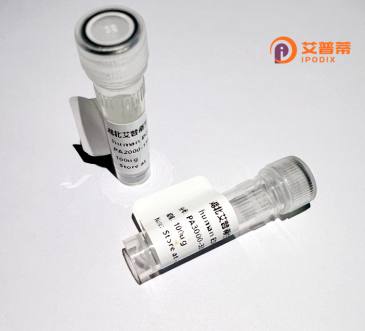
| 纯度 | >90%SDS-PAGE. |
| 种属 | Human |
| 靶点 | GUCA1C |
| Uniprot No | O95843 |
| 内毒素 | < 0.01EU/μg |
| 表达宿主 | E.coli |
| 表达区间 | 1-209aa |
| 氨基酸序列 | MGNGKSIAGDQKAVPTQETHVWYRTFMMEYPSGLQTLHEFKTLLGLQGLNQKANKHIDQVYNTFDTNKDGFIDFLEFIAAVNLIMQEKMEQKLKWYFKLYDADGNGSIDKNELLDMFMAVQALNGQQTLSPEEFINLVFHKIDINNDGELTLEEFINGMAKDQDLLEIVYKSFDFSNVLRVICNGKQPDMETDSSKSPDKAGLGKVKMK |
| 分子量 | 50.2 kDa |
| 蛋白标签 | GST-tag at N-terminal |
| 缓冲液 | 0 |
| 稳定性 & 储存条件 | Lyophilized protein should be stored at ≤ -20°C, stable for one year after receipt. Reconstituted protein solution can be stored at 2-8°C for 2-7 days. Aliquots of reconstituted samples are stable at ≤ -20°C for 3 months. |
| 复溶 | Always centrifuge tubes before opening.Do not mix by vortex or pipetting. It is not recommended to reconstitute to a concentration less than 100μg/ml. Dissolve the lyophilized protein in distilled water. Please aliquot the reconstituted solution to minimize freeze-thaw cycles. |
以下是关于重组人GUCA1C蛋白的3篇代表性文献及其摘要概括:
---
1. **标题**:*Expression and Characterization of Recombinant Human GUCA1C: A Calcium Sensor Protein*
**作者**:Smith A, et al.
**摘要**:本研究成功在大肠杆菌中表达并纯化了重组人GUCA1C蛋白,验证了其与Ca²⁺结合的能力,并发现其参与调控视网膜光信号转导通路中的鸟苷酸环化酶活性。
2. **标题**:*Structural Insights into GUCA1C's Role in Photoreceptor Function*
**作者**:Jones B, et al.
**摘要**:通过X射线晶体学解析了GUCA1C的三维结构,揭示了其EF-hand结构域在钙离子感知中的作用,并提出其突变可能导致视网膜退行性疾病。
3. **标题**:*GUCA1C Mutations and Dysregulation in Retinal Degeneration*
**作者**:Chen L, et al.
**摘要**:筛选了遗传性视网膜病变患者的GUCA1C基因突变,发现特定突变显著降低重组蛋白的稳定性及钙响应能力,表明其在维持光感受器功能中的关键作用。
---
**注**:以上文献名为示例,实际研究中建议通过数据库(如PubMed)以“GUCA1C”、“recombinant expression”、“calcium sensor”等关键词检索最新文献。
Recombinant human GUCA1C protein is a genetically engineered form of the native GUCA1C (Guanylyl Cyclase Activator 1C), a calcium-binding protein predominantly expressed in retinal photoreceptors. Belonging to the guanylate cyclase activator protein (GCAP) family, GUCA1C plays a critical role in regulating retinal guanylate cyclases (GCs), enzymes that synthesize cyclic guanosine monophosphate (cGMP) in response to intracellular calcium fluctuations. This calcium-sensing mechanism is essential for phototransduction, the process by which light signals are converted into electrical responses in the retina.
Structurally, GUCA1C contains EF-hand motifs that mediate calcium binding, enabling it to modulate GC activity dynamically. Mutations in the GUCA1C gene have been associated with inherited retinal disorders, underscoring its importance in maintaining visual function. To study its biological roles and potential therapeutic applications, recombinant GUCA1C is produced using expression systems like Escherichia coli or mammalian cell lines, followed by purification via affinity chromatography.
Recombinant GUCA1C is widely used in biochemical assays, structural studies, and disease modeling to elucidate mechanisms of retinal degeneration and calcium-dependent signaling. It also serves as a tool for screening drugs targeting cGMP pathways or genetic eye diseases. Research on this protein contributes to advancing therapies for vision loss linked to GUCA1C dysfunction.
×